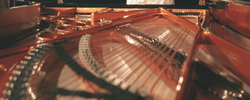Tuning, Repairs and Restoration
Piano Tuning, Repair and Restoration
Find a tuner: Australian Piano Tuners and Technicians Association www.aptta.org.au
Many people ask us for advice on “fixing up an old piano”. Pianos are built to have a life span of 50 to 80 years in a domestic environment, and 20 to 25 years in a performance or education environment. After this time, soundboard flattens, strings go dull and the performance of the piano is significantly lowered.
Restoration is possible;
* If it is a particularly good one. Like finding a super rare Mercedes, you need to have the top model from the top manufacturer, and the right year.
* If you understand the expected result. The cabinet may look superb, but it will not play like a brand new piano. Drop in to the showroom if you’d like to understand the five steps in pianos and what performance level to expect.
* If you have money to spend. Consider that parts will break, and unexpected issues will arise that may cost more than expected.
* If it’s a very special family piece, and you tick the above points.
If you have a treasured family piano that is at the end of its life span, perhaps consider trading it in at Bernies Music Land towards a piano that brings new excitement and many years of enjoyment to your family. Give us a call on 9872 5122 to chat.
Piano Tuning
When you purchase a lovely instrument it must be taken care of to ensure lasting value.
Like a car, your piano needs minor and major servicing, which depends on the use and care of the instrument.
Most tuners will recommend that you tune your piano once or up to twice a year, as a piano can be affected by temperature and can go slightly ‘out of tune’ as the seasons change from summer to winter.
In schools, or where an instrument is frequently used, it is common to undertake more regular tuning.
We recommend you chat with your tuner to plan the care for your instrument, taking into account;
* How much you are playing,
* The age and condition of the piano,
* The environment the piano is in,
* And any other factors like windows, heating and cooling.
Piano Major Service
Regulation and Action Maintenance
The inner playing mechanism, or “piano action”, is an amazingly complex and sensitive machine. Over the years, the 8,800 moving parts in your piano wear and come loose. Like any other machine, it needs to be kept in adjustment so that it works the way it was meant to work when it was built.
Each key on your piano has over 25 points of adjustment that need to work together to produce the sound you hear when you play just one note.
In order to compensate for wear, compacting of cloth and felt, and changes in wooden parts due to humidity, periodic adjustments must be made. Keeping the correct relationship between every part will prevent unnecessary wear, and will make the action “feel right” -that is, each key will function smoothly and evenly throughout the whole keyboard.
Bernies Music Land recommends that regulation be conducted as part of your piano’s service plan at least every three to five years.
Voicing
Each piano has its own distinct sound or “voice”. That is how it was built and that is its personality.
Over many years, whilst the piano is played, the hammer felt strikes the strings thus compacting and wearing down the felt. This hardening can cause the tone to become too harsh or bright, and it’s difficult to produce a wide or even range of tone, no matter how much you try to play using dynamics.
Either way, a technician can treat the hammers in various ways: by aligning, shaping, careful needling or hardening the hammers, in order to change the tone production. Voicing is a personal choice. Your tuner can discuss voicing with you, taking into consideration the age and potential of your instrument.
Adjustments
Maintenance including adjustments to fixing sticky or sluggish keys, adjusting or lubricating pedal mechanism and replacement of broken strings, are part of your maintenance and can be attended to by your tuner.
Make sure to write down each query so you can chat through when your tuner next visits.


